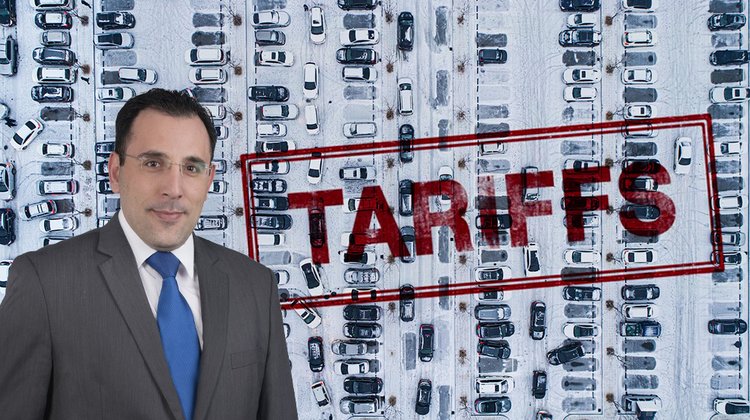Tassos J. Yiasemides: The imposition of tariffs could trigger chain reactions that are difficult to predict
Tassos J. Yiasemides 07:13 - 01 April 2025

The decision of the new American president to impose tariffs on the automotive industry created reactions by many leaders from Europe to Asia. Markets reacted negatively, showing a decline, while gold reached new highs—similar to previous periods characterised by instability and volatility.
Germany’s already weakened automotive industry, struggling with rising production costs and declining exports to Russia and China, is facing yet another blow. French industry is in similar position. Meanwhile, Japanese manufacturers are also expressing concerns. According to international reports, German automakers are at greater risk, as they export more vehicles to the U.S. than any other country, including many internal combustion engine models with higher profit margins.
The American president’s approach is based on the following logic: strengthening his country’s automotive industry (let’s not forget the involvement of major campaign donors) by boosting domestic sales to replace imported vehicles and encouraging companies that want to sell in the U.S. to establish manufacturing facilities there.
However, replacing imported cars with domestically produced ones is not an easy task in the short term. This could potentially lead to inflationary pressures, as supply may not be able to meet demand—at least in the short run.
Today, global trade is far more complex. Supply chains are now globally interconnected, with products assembled from components manufactured in multiple countries. The imposition of tariffs could trigger chain reactions that are difficult to predict.
Trump is exerting pressure on businesses seeking access to the American market to shift production to the U.S. To achieve this, he offers significant tax breaks and incentives.
His primary goal is to increase jobs in the U.S., although it remains uncertain whether there is sufficient labor to meet the demand. At the same time, he aims to prevent companies from investing in Mexico, where lower labor costs have made the country a hub for many industries that later export their products to the U.S.
For this plan to succeed, the U.S. must develop the necessary industrial capacity to replace imports with competitive products. At the same time, the country must maintain strong trade relations, as tariffs could provoke retaliatory measures and reduce American exports. It is clear that tariffs alone cannot provide a comprehensive solution.
For Trump, tariffs are not merely an economic tool but also a means of establishing American dominance in global trade, energy, and monetary power. His strategies seem to extend beyond purely commercial matters, touching on critical trade routes such as the Panama Canal.
The European Union finds itself in a weak position in these trade conflicts. It has no key role in negotiations between the U.S. and Russia, nor in developments in Ukraine and U.S.-China relations. Additionally, if China loses part of its exports to the U.S., it may seek greater access to the European market, leading to new trade dilemmas. The same applies to Japan (the average Cypriot might think there will be opportunities due to lower car prices).
A Bloomberg article recently revealed Trump’s plan regarding Ukraine and its full economic control, effectively distancing it from Europe. According to the revised cooperation proposal, the U.S. would have priority rights over investments in all infrastructure and natural resource projects.
The agreement would grant the U.S. the primary share of profits transferred to a special reconstruction investment fund controlled by them. The material and financial resources provided to Ukraine would contribute to this fund.
Ukraine’s government would be required to allocate 50% of its revenues from all new natural resources and infrastructure projects to the fund, with the U.S. entitled to all profits plus a 4% annual return until their investment is recovered, according to the draft proposal.
Additionally, the U.S. would have the right to purchase Ukraine’s metals, minerals, oil, and natural gas before other parties under commercial terms, significantly limiting raw materials for European industries.
Although Cyprus does not have an automotive industry, tariffs on car imports could indirectly affect the country. As a member of the European Union, Cyprus’ economy is closely tied to major European markets, particularly Germany’s. If key EU economies suffer due to reduced car exports, economic instability could impact the broader European market, including Cyprus.
Cyprus serves as a strategic maritime hub, and disruptions in global trade flows due to tariffs could affect shipping and demand for maritime services. If the European economy slows down due to American tariffs, this could also reduce tourist flows to Cyprus. A weaker European income could limit travelers' budgets, affecting the island’s tourism revenues.
Although Cyprus is not at the center of this trade conflict, the broader impact of U.S. tariffs on the EU could create long-term uncertainty. The extent of the impact will depend on the EU’s response, the possibility of tariff exemptions, and how businesses adapt to the new trade conditions shaped by Trump’s protectionist policies. Lastly, it is not clear whether there will be any delays in deliveries of cars in Europe, considering the limitations in raw materials that might arise, and whether for some producer may become unprofitable producing specific types of cars.
*Tassos J. Yiasemides, Board Member, Head of Global Compliance Management Services, KPMG Limited

